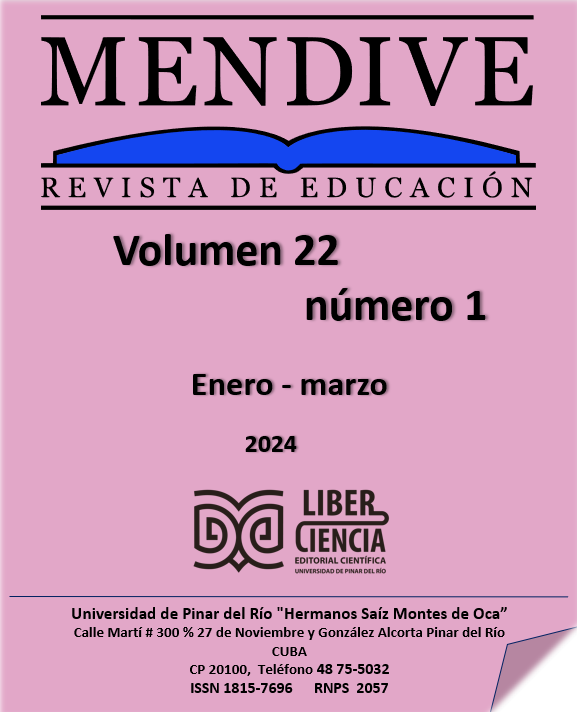Didactic conception that contributes to the teaching of the theory of patronage networks
Main Article Content
Abstract
Teaching-learning process of the History of Cuba (TLP) needs a constant renewal with the purpose of dynamizing it, for this the teaching of the theory of clientelistc networks is introduced from the contents of the History of Cuba in the Bachelor of Education career, specialty Marxism Leninism and History. The purpose of the article is to describe the didactic conception that contributes to the teaching of the theory of patronage networks from the contents of the History of Cuba in the Bachelor of Education career, specializing in Marxism Leninism and History; for these theoretical level methods were used, and empirical level, with a predominantly quantitative approach. All of this allowed us to conclude by pointing out that there is potential to insert the teaching of the theory of patronage networks from the contents of the History of Cuba in the teaching learning process in the Bachelor of Education career, specializing in Marxism Leninism and History; however, limitations are appreciated since there is little knowledge on the part of the professors about the teaching of the theory of clientelistc networks, for which it became necessary to prepare the group of professors to insert it. The research can be used in the various teaching modalities of Higher Education in Cuba, which strengthens the result achieved; it is part of the institutional project of the Department of History and Marxism Leninism: History, thought and educational innovation; it is also the result of a doctoral thesis on Doctorate in Educational Sciences of the UNISS.
Downloads
Article Details

This work is licensed under a Creative Commons Attribution-NonCommercial 4.0 International License.
References
Allier, M.E. (julio 2018). Balance de la historia del tiempo presente. Creación y consolidación de un campo historiográfico. Revista de Estudios Sociales, (65). http://journals.openedition.org/revestudsoc/10356
Bédarida, F. (2018). Definición, método y práctica de la Historia del Tiempo Presente. Cuadernos de Historia Contemporánea, (20), pp. 19-27. https://revistas.ucm.es/index.php/CHCO/article/view/CHCO9898110019A/7004
Castro, R. (2017). Vertientes analíticas del clientelismo electoral: ¿son valores o puro interés? Revista Apuntes electorales, 16(56), 123-152. https://aelectorales.ieem.org.mx/index.php/ae/article/view/94
Fazio, V. H. (2018). Historia del tiempo presente y presente histórico. Historiografías: revista de historia y teoría, (15), 22-35. https://doi.org/10.26754/ojs_historiografias/hrht.2018152888
González, M. (2015). La teorización de Julio Aróstegui sobre la historia del tiempo presente. Revista de Historia Contemporánea, Historia Nova, (13), 126-133.
López, Á., M. (2019). ¿Es posible la historia del presente? Conceptos, debates y propuestas. Revista de la Red de Intercátedras de Historia de América Latina Contemporánea, 6(11).
Muñoz, R., E. (2017). Las relaciones pasado-presente en la enseñanza de la Historia: en busca de los sentidos de los aprendizajes históricos. Enseñanza de las ciencias sociales: revista de investigación, (16), 103-114, https://raco.cat/index.php/EnsenanzaCS/article/view/334521
Ovalle P., D. (2021). El historiador del tiempo presente como un sujeto "afectado por el pasado". Escritura de la historia y conciencia histórica. Revista de Historia, 1(28), 395-422. https://doi.org/10.29393/RH28-15HTDO10015
Pérez A., & Luján, D. (2018). Cercanía, favor, lealtad. Clientelismo en dos municipalidades chilenas. Sociológica (México), 33(94), 235-268.
Sánchez Balmaseda, M. I. (1995). Análisis de redes sociales e historia: una metodología para el estudio de redes clientelares. Universidad Complutense de Madrid: España. https://dialnet.unirioja.es/servlet/libro?codigo=238429
Soto, G., A. (2022). Historia del presente: estado de la cuestión y conceptualización. Historia Actual Online, (3), 101-116. https://doi.org/10.36132/hao.v0i3.34
Tahull, J. (2017). Social phenomenon of clientelism in Spain. Revista Internacional de Investigaciones de Ciencias Sociales, 13(1) https://doi.org/10.18004/riics.2017.julio.93-111.
Zeuske, M. (2002). Los negros hicimos la independencia: aspectos de la movilización afrocubana en el hinterland cubano. Cienfuegos entre colonia y república. En Ciencias Sociales (Ed.), Espacios, silencios y sentidos de libertad. Cuba entre 1878 y 1912 (pp.193-234). Editorial de Ciencias Sociales.


